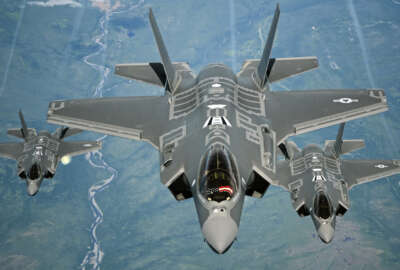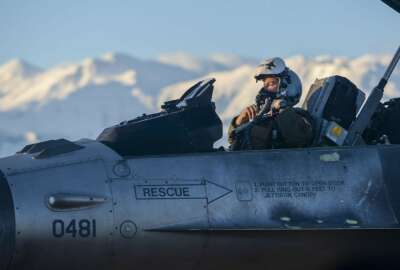
Military civilian workforce summit gives Air Force first forum on talent management
The Air Force is trying to think differently about how it handles it's most important investment.
In the past year and a half the Air Force has made a significant push to ease unnecessary burdens on its airmen and give them more time with their families to better the force.
The most recent iteration of that includes a military and civilian workforce summit hosted by the Air Force Talent Management Innovation Cell. That summit wrapped up this week.
“We view talent as a collective set of knowledge, skills, abilities, experiences and potential that our Airmen bring to the Air Force. Air Force talent management is an integrated set of personnel processes designed to meet mission objectives by optimizing Airmen’s talent,” said Lt. Gen. Gina Grosso said, deputy chief of staff for manpower, personnel and services in a Sept. 1 statement.
Federal News Radio talked exclusively with Col. Fred Thaden, director of the Talent Management Innovation Cell, about the summit.
The event brought together stakeholders from the military, civilian and academic worlds to focus on talent management gaps especially in areas surrounding civilian hiring, manpower requirements management, officer performance and IT transformation.
“We decided to focus on [those topics] and spend some time with some breakout groups, senior leaders from the Air Force coming in and discussing how can we improve in those areas? What changes do we need to make in the United States Air Force? When we talk about talent management, it’s a wide portfolio and a number of topics. So we decided these were the first four things we would like to attack in this summit and come up with some recommendations for our senior leaders to consider to bring in talent and retain that talent,” Thaden said.
The Air Force has already made a number of changes to its talent management and requirements for airmen. Most recently it started an effort to condense the 1,300 instructions that the airmen must follow.
Air Force Secretary Heather Wilson said the instructions are often outdated, inconsistent and breed cynicism in the force.
Air Force Assistant Deputy Chief of Staff for Manpower, Personnel and Services Todd Fore told Federal News Radio the personnel office wants to finish up its instruction reduction by December 2018.
“We will work through a methodical process, step-by-step in doing that and get back to what’s in law and what’s in policy and if it’s in policy how much freedom do we give airmen?” Fore said. “We need to go through and, no kidding, look at those instructions that are out of date and modernize the way we actually give instructions to airmen.”
Thaden said the Air Force Task Force Innovation Cell is looking even broader than reducing burdens on airmen with the military civilian workforce summit.
“We have numerous governance structures and forums to discuss weapon system development, but we haven’t really had a workforce forum to discuss talent management or the Air Force’s number one priority, our people, our airmen. The workforce summit was the first step in building a battle rhythm for prioritization, funding and overall oversight of talent management initiatives in line with other decision making forums in the Air Force,” said Maj. Mike Lupher, chief of workforce development at the Talent Management Innovation Cell. “If we are going to succeed in today’s war and tomorrow’s wars, it’s because we invest in managing talent.”
Thaden said within the four areas the cell is focusing on there are certain priorities. For civilian hiring, the Air Force wants to bring civilians on board quicker.
“Right now our processes are a bit antiquated. We have certain laws and policies and regulations that limit our ability to bring in the talent that we need quickly and what that does is it creates a frustration with those that want to come work for the United States Air Force,” Thaden said.
Another area the cell is working on is better evaluating officer performance.
“We spent quite a bit of time talking about what do we value in officer performance? What is it that officers bring to the table that is unique in the United States Air Force and how do we best identify those values, how do we communicate those values, how do we measure those things that we value and then how do we evaluate them and promote our officers?” Thaden said.
Copyright © 2024 Federal News Network. All rights reserved. This website is not intended for users located within the European Economic Area.
Scott Maucione is a defense reporter for Federal News Network and reports on human capital, workforce and the Defense Department at-large.
Follow @smaucioneWFED





